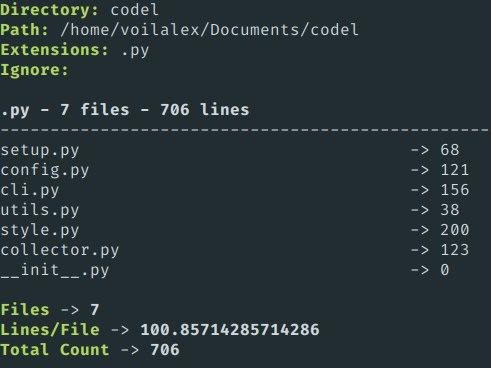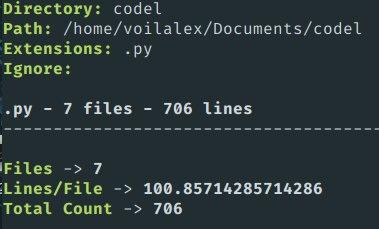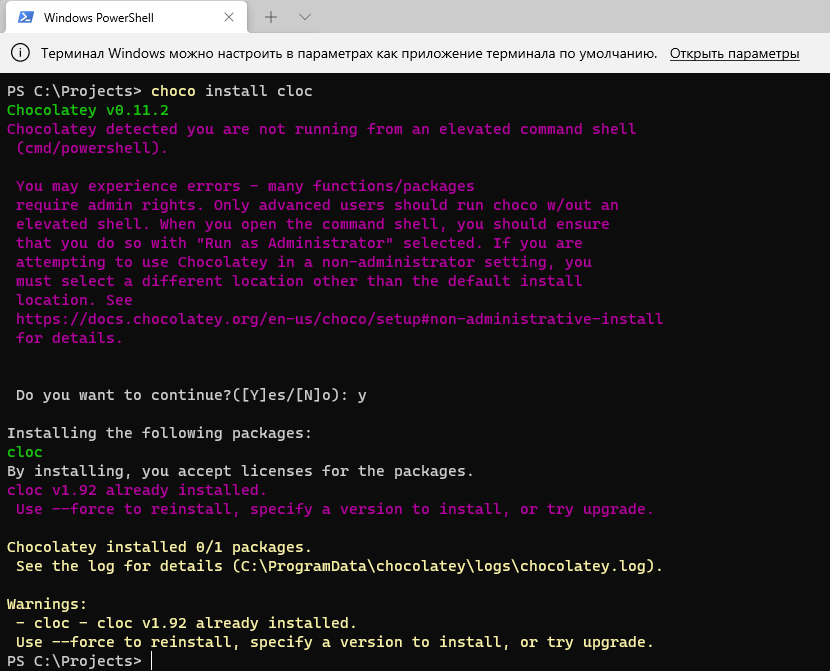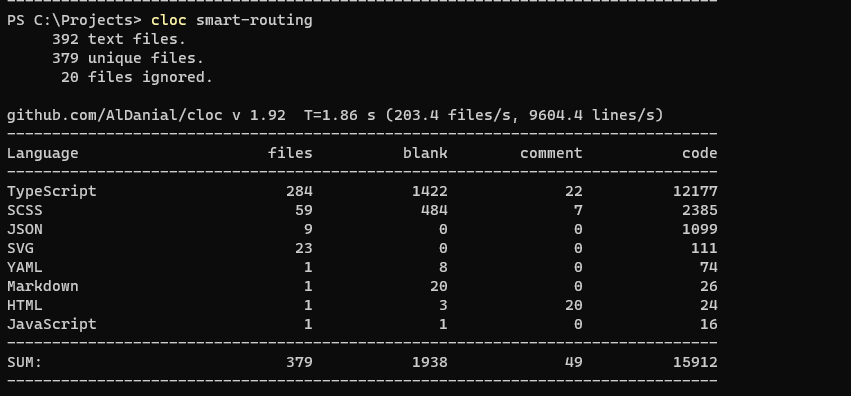bash tools are always nice to use, but for this purpose it seems to be more efficient to just use a tool that does that. I played with some of the main ones as of 2022, namely cloc (perl), gocloc (go), pygount (python).
Got various results without tweaking them too much.
Seems the most accurate and blazingly fast is gocloc.
Example on a small laravel project with a vue frontend:
gocloc
$ ~/go/bin/gocloc /home/jmeyo/project/sequasa
-------------------------------------------------------------------------------
Language files blank comment code
-------------------------------------------------------------------------------
JSON 5 0 0 16800
Vue 96 1181 137 8993
JavaScript 37 999 454 7604
PHP 228 1493 2622 7290
CSS 2 157 44 877
Sass 5 72 426 466
XML 11 0 2 362
Markdown 2 45 0 111
YAML 1 0 0 13
Plain Text 1 0 0 2
-------------------------------------------------------------------------------
TOTAL 388 3947 3685 42518
-------------------------------------------------------------------------------
cloc
$ cloc /home/jmeyo/project/sequasa
450 text files.
433 unique files.
40 files ignored.
github.com/AlDanial/cloc v 1.90 T=0.24 s (1709.7 files/s, 211837.9 lines/s)
-------------------------------------------------------------------------------
Language files blank comment code
-------------------------------------------------------------------------------
JSON 5 0 0 16800
Vuejs Component 95 1181 370 8760
JavaScript 37 999 371 7687
PHP 180 1313 2600 5321
Blade 48 180 187 1804
SVG 27 0 0 1273
CSS 2 157 44 877
XML 12 0 2 522
Sass 5 72 418 474
Markdown 2 45 0 111
YAML 4 11 37 53
-------------------------------------------------------------------------------
SUM: 417 3958 4029 43682
-------------------------------------------------------------------------------
pygcount
$ pygount --format=summary /home/jmeyo/project/sequasa
┏━━━━━━━━━━━━━━━┳━━━━━━━┳━━━━━━━┳━━━━━━━┳━━━━━━━┳━━━━━━━━━┳━━━━━━┓
┃ Language ┃ Files ┃ % ┃ Code ┃ % ┃ Comment ┃ % ┃
┡━━━━━━━━━━━━━━━╇━━━━━━━╇━━━━━━━╇━━━━━━━╇━━━━━━━╇━━━━━━━━━╇━━━━━━┩
│ JSON │ 5 │ 1.0 │ 12760 │ 76.0 │ 0 │ 0.0 │
│ PHP │ 182 │ 37.1 │ 4052 │ 43.8 │ 1288 │ 13.9 │
│ JavaScript │ 37 │ 7.5 │ 3654 │ 40.4 │ 377 │ 4.2 │
│ XML+PHP │ 43 │ 8.8 │ 1696 │ 89.6 │ 39 │ 2.1 │
│ CSS+Lasso │ 2 │ 0.4 │ 702 │ 65.2 │ 44 │ 4.1 │
│ SCSS │ 5 │ 1.0 │ 368 │ 38.2 │ 419 │ 43.5 │
│ HTML+PHP │ 2 │ 0.4 │ 171 │ 85.5 │ 0 │ 0.0 │
│ Markdown │ 2 │ 0.4 │ 86 │ 55.1 │ 4 │ 2.6 │
│ XML │ 1 │ 0.2 │ 29 │ 93.5 │ 2 │ 6.5 │
│ Text only │ 1 │ 0.2 │ 2 │ 100.0 │ 0 │ 0.0 │
│ __unknown__ │ 132 │ 26.9 │ 0 │ 0.0 │ 0 │ 0.0 │
│ __empty__ │ 6 │ 1.2 │ 0 │ 0.0 │ 0 │ 0.0 │
│ __duplicate__ │ 6 │ 1.2 │ 0 │ 0.0 │ 0 │ 0.0 │
│ __binary__ │ 67 │ 13.6 │ 0 │ 0.0 │ 0 │ 0.0 │
├───────────────┼───────┼───────┼───────┼───────┼─────────┼──────┤
│ Sum │ 491 │ 100.0 │ 23520 │ 59.7 │ 2173 │ 5.5 │
└───────────────┴───────┴───────┴───────┴───────┴─────────┴──────┘
Results are mixed, the closest to the reality seems to be the gocloc one, and is also by far the fastest:
- cloc: 0m0.430s
- gocloc: 0m0.059s
- pygcount: 0m39.980s




